Introduction
In a significant ruling, the Supreme Court of India clarified that a Trial Court cannot take cognizance of an offence not included in the chargesheet solely on the basis of affidavits filed by private witnesses. The decision was delivered in Deepak Yadav v. State of Uttar Pradesh, where the apex court overturned the Allahabad High Court’s approval of a Trial Court order invoking Section 394 IPC (voluntarily causing hurt while committing robbery) without adequate evidentiary basis.
This judgment strengthens the principle of fair trial and procedural due process by emphasizing that cognizance of an offence must be grounded in investigation records, police case diaries, or further inquiry — not private affidavits alone.
Background of the Case
- Initial FIR:
- The FIR was filed under Sections 394, 452, 323, 504, 506 of the Indian Penal Code (IPC) along with provisions of the SC/ST (Prevention of Atrocities) Act.
- Chargesheet Filing:
- After investigation, the police submitted a chargesheet but excluded Section 394 IPC.
- Complainant’s Applications:
- Dissatisfied, the complainant repeatedly applied to the Trial Court to include Section 394 IPC.
- Trial Court’s Order:
- Eventually, the Trial Court took cognizance of Section 394, but only on the basis of affidavits submitted by the complainant’s witness.
- High Court’s Approval:
- The Allahabad High Court upheld the Trial Court’s order, allowing the addition of Section 394 IPC.
- Supreme Court Appeal:
- The appellants challenged this decision before the Supreme Court, arguing that such reliance on private affidavits was legally unsustainable.
Supreme Court’s Observations
The bench led by Justice Ahsanuddin Amanullah and Justice S.C. Sharma found serious flaws in the Trial Court and High Court’s approach.
1. Reliance on Private Affidavits Is Not Permissible
- The Court held that affidavits from private witnesses cannot substitute proper investigation records.
- Cognizance of an offence like Section 394 IPC requires judicial satisfaction based on police records, witness statements under Section 161 CrPC, or further inquiry.
“Only on the basis of affidavits of witnesses filed along with the petition on behalf of the complainant, the Court has taken cognizance under Section 394 of the IPC. We do not approve of such exercise in the manner it has been done.” – Supreme Court
2. Duty of Trial Courts to Examine Records
- Trial Courts must call upon the Police to produce the entire case diary under Section 172 CrPC.
- Courts must independently evaluate whether the ingredients of the offence are satisfied before taking cognizance.
3. Prosecution’s Failure in Disclosure
- The prosecution failed to furnish complete witness statements under Section 161 CrPC, depriving the court of a fair assessment.
- The Supreme Court stressed that suppression of material facts or statements is impermissible.
4. Remedy Ordered by the Court
- The Supreme Court set aside the cognizance order and remanded the matter back to the Trial Court.
- Directions issued:
- The Trial Court must summon the complete police case diary.
- If affidavits mention witnesses not examined by the police, those affidavits should be forwarded to the police for further investigation.
- The police must file a supplementary report within six weeks.
- Only thereafter can the Trial Court decide on cognizance and framing of charges.
5. Accountability of Police Officers
- The Supreme Court held that the Superintendent of Police, Jhansi, will be personally liable if any material evidence is suppressed.
- This ensures free and impartial investigation.
Legal Significance of the Judgment
Upholding Procedural Fairness
The ruling reiterates that criminal procedure must follow due process. A mechanical addition of offences undermines fairness and creates scope for misuse of law.
Role of Section 172 CrPC
By directing the Trial Court to examine the police case diary, the Court reinforced the *critical evidentiary value of investigation records in determining cognizance.
Limiting Abuse of Affidavits
Private affidavits, while supplementary, cannot form the sole basis for invoking serious charges like robbery under Section 394 IPC. This curbs potential abuse where complainants may attempt to influence proceedings by filing affidavits outside the investigative framework.
Accountability of Investigating Officers
The ruling warns police officers against suppression of evidence. By holding the Superintendent of Police personally accountable, the Court has ensured a higher degree of responsibility and transparency in investigations.
Broader Implications
- For Trial Courts
- They must independently scrutinize all available materials before taking cognizance of additional offences.
- They cannot simply rely on applications or affidavits by private parties.
- For Complainants
- While affidavits can highlight missing evidence, the proper channel remains through further investigation under Section 173(8) CrPC.
- For Police Authorities
- The judgment imposes a stricter obligation to submit the entire case diary and complete witness statements.
- Suppression of material evidence could now invite personal liability.
- For Accused Persons
- This ruling safeguards accused individuals from arbitrary addition of charges without sufficient material on record.
Conclusion
The Supreme Court’s ruling in Deepak Yadav v. State of Uttar Pradesh is a vital precedent in criminal procedure law. It ensures that Trial Courts cannot bypass proper investigation mechanisms and take cognizance of offences based only on private affidavits.
By mandating reliance on case diaries, Section 161 statements, and supplementary investigations, the Court has reaffirmed the principle that justice must rest on verified evidence, not untested affidavits.
This landmark decision not only strengthens procedural safeguards for accused persons but also holds the police accountable for full disclosure, thereby promoting free, fair, and impartial criminal investigations in India.
Also Read


